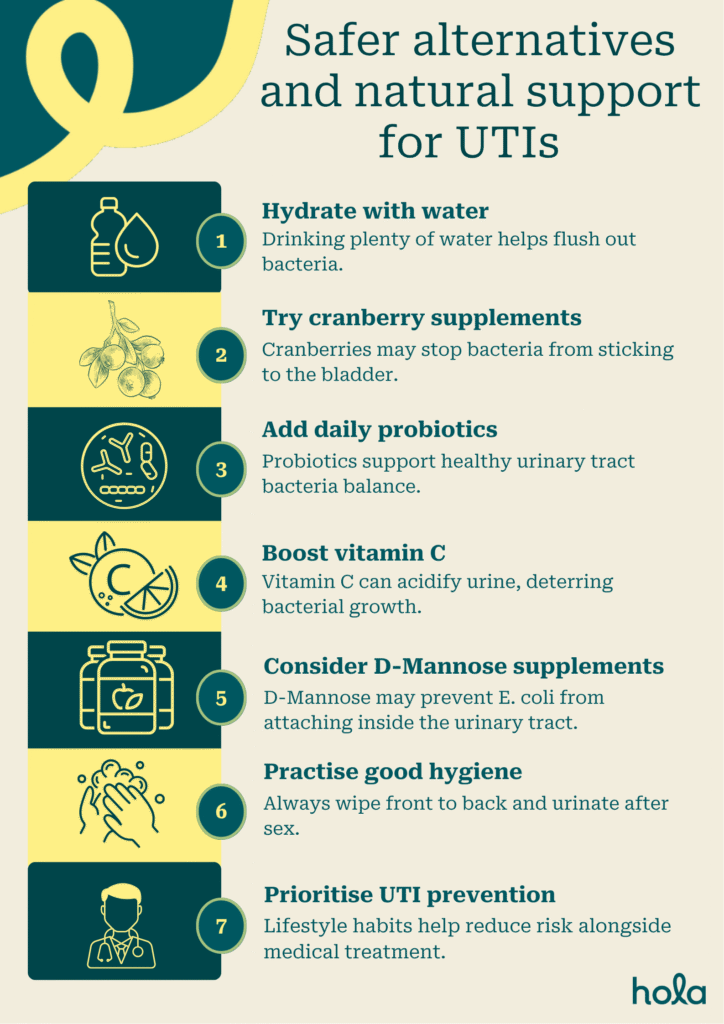Epsom salt for urinary tract infections: Does it help?
Written by the editorial staff writer at Hola. Medically Reviewed by Dr. Ammar AL-ANI, MBChB, CCBST, AMC.

Contents

Summary: Epsom salt baths might provide relief from discomfort related to urinary tract infections (UTIs), like pelvic pain and muscle tension, due to magnesium's calming properties. Nonetheless, Epsom salt does not cure the bacterial infection itself. Effective treatment for UTIs necessitates medication prescribed by a healthcare provider. While an Epsom salt bath may offer short-term relief, it should not substitute professional medical care. Always reach out to a healthcare expert for an accurate diagnosis and treatment if you think you have a UTI.
Urinary Tract Infections (UTIs) are common, accounting for 1.2% of all problems managed in Australian general practice consultations. These infections affect the urinary system, such as the bladder, kidneys, and urethra, causing symptoms like pain, frequent urination, and pain. To ease these symptoms, many people turn to natural remedies, including Epsom salt, for relief. Many wonder if Epsom salt is effective in treating UTIs. Let’s explore the potential benefits and limitations of using Epsom salt for treating urinary tract infections.
What is a UTI, and what causes it?
A UTI (urinary tract infection) refers to an infection that can affect any part of the urinary system, including the bladder, urethra, ureters, or kidneys. It most frequently occurs in the lower urinary tract, specifically in the bladder and urethra. Typically, UTIs are caused by bacteria, primarily Escherichia coli (E. coli), which are normally found in the intestines but can enter the urinary tract through the urethra. Other contributing factors include inadequate hygiene, insufficient fluid intake, sexual activity, catheter usage, or a compromised immune system.What is Epsom salt?
Epsom salt is a natural compound made of magnesium sulphate (MgSO₄). Despite its nomenclature, it is not a salt in the same sense as table salt. It was first identified in the town of Epsom in England, which is how it received its name. Epsom salt is frequently utilised in baths to relieve muscle soreness, reduce stress levels, and alleviate minor aches. It can also serve as a laxative, enhance soil in gardening, or be used for various household applications.Does Epsom salt help UTI symptoms?
While Epsom salt doesn’t cure a urinary tract infection (UTI), soaking in a warm Epsom salt bath may help alleviate some symptoms, including pelvic discomfort or muscle tension. The magnesium in Epsom salt can assist in relaxing muscles and relieving general discomfort, but it doesn’t eliminate the bacteria responsible for the infection. For effective treatment of a UTI, medication prescribed by a doctor are usually essential. Soaking in Epsom salt baths can provide soothing relief, but they are not a substitute for medical treatment.
Also read: UTI: Everything You Need To Know
Can an Epsom salt bath help a bladder infection?
An Epsom salt bath may help reduce discomfort from a bladder infection, such as lower abdominal pain or body aches, by promoting muscle relaxation. However, it does not address the infection itself or eradicate the bacteria involved. Bladder infections (a specific type of UTI) generally necessitate medication prescribed by a healthcare provider. Epsom salt baths can offer soothing support for symptoms, but they should not replace recommended medical care. Always consult a healthcare professional for appropriate treatment.
Feeling sick and unsure why? Speak with a GP online in 15 minutes.
What to do if you suspect a UTI
If you think you may have a UTI, here’s what you should consider:- Consult a doctor: Make an appointment with a healthcare provider for an accurate diagnosis and treatment. UTIs typically require medication for resolution.
- Stay hydrated: Drink plenty of fluids to help eliminate bacteria from the urinary system.
- Limit irritants: Avoid caffeine, alcohol, and acidic foods, as they can aggravate the bladder.
- Adhere to prescribed medications: If you receive a diagnosis, ensure you complete the entire course of medicine as directed, even if symptoms start to improve.
- Manage discomfort: Over-the-counter medicines or using a heating pad, can help ease pain until you can consult a doctor.
Also read: Urinary Tract Infections: Causes, Symptoms, And Treatment
Safer alternatives and natural support for UTIs
Though medicine are generally necessary to treat UTIs, there are several natural approaches and lifestyle modifications that may support bladder health and help prevent infections:
- Hydrate well: Drinking sufficient water aids in flushing bacteria out of the urinary system.
- Cranberry juice or supplements: Cranberries contain substances that might help prevent bacteria from adhering to the bladder wall. However, it is more effective as a preventative strategy rather than a treatment.
- Probiotics: Utilising probiotics may assist in reinstating healthy bacteria in the urinary tract and preventing UTIs.
- Vitamin C: Consuming Vitamin C could help acidify urine, potentially inhibiting bacterial growth.
- D-mannose: A type of sugar found in cranberries, D-mannose may hinder E. coli bacteria from attaching to the urinary tract.
- Maintain good hygiene: Wipe from front to back after using the restroom and urinate post-sexual activity to lower the risk of bacteria entering the urinary tract.

When should I see a doctor for a UTI?
You should consult a doctor if you have severe symptoms of a UTI, such as an elevated temperature, chills, or discomfort in the back and pelvic area, as these may suggest that the infection has advanced to the kidneys. The presence of blood in the urine, ongoing or worsening symptoms, or pain when urinating are additional indicators that you require medical evaluation. Pregnant individuals, those with weakened immune systems, older adults, or people with chronic health issues should seek medical assistance without delay. Prompt treatment with antibiotics is crucial to avoid complications, including kidney infections or recurring UTIs. If you're uncertain, it’s always best to speak with a doctor.
Conclusion
In conclusion, while Epsom salt baths may offer short-term relief from UTI discomfort, they are not a cure. UTIs require appropriate medical treatment, to address the underlying infection. Epsom salt may provide comfort, but it should never substitute professional care.
FAQs
Do Epsom salts help UTI?
Epsom salts may provide temporary relief from UTI discomfort by relaxing muscles and easing tension, but they don’t cure the infection. UTIs must be treated with medication, hence, medical advice is essential.
Does Epsom salt remove infection?
No, Epsom salt does not remove or cure infections. While it may help ease discomfort or swelling in a warm bath, Epsom salt doesn’t have the germ-fighting ability to combat infections like UTIs. Professional treatment is necessary.
Is it safe to take an Epsom salt bath if I have a UTI?
Yes, it is generally safe to take an Epsom salt bath with a UTI, and it may help relieve discomfort. However, avoid overly hot water and discontinue if sensitivity develops. Always consult a doctor for appropriate treatment.
What are the risks of using Epsom salt for a UTI?
While generally safe, potential risks include skin irritation, symptom aggravation from overly hot water, or delaying proper treatment. Epsom salts don’t cure the infection, so relying on them alone may lead to complications.
Can I treat a UTI at home without medicines?
Mild UTI symptoms may improve with rest and plenty of fluids. However, most UTIs need medication to completely clear the infection. Delaying treatment may lead to complications.
Does Hola Health offer online prescriptions for UTIs?
Yes, Hola Health offers online treatment for urinary tract infections (UTIs) in Australia. You may consult with an AHPRA-registered doctor through a secure video or phone consultation, typically within 15 minutes. If necessary, the doctor may prescribe medication and send the prescriptions directly to your phone or preferred pharmacy. This service is available 24/7, even on holidays.
Is it safe for a woman to soak in Epsom salt?
Yes, it is usually safe for women to soak in an Epsom salt bath. It can help with muscle relaxation, stress relief, and mild discomfort. However, pregnant women, those with sensitive skin, or specific health issues (like diabetes or open wounds) should consult a doctor before using Epsom salts.
Is Epsom salt safe for private areas?
Epsom salts are generally safe for external use in a bath, but avoid applying them directly to sensitive areas, such as the genital area, especially if you have skin irritation or sensitivity. Soaking in an Epsom salt bath is usually fine, but ensure the water is not too hot and rinse afterwards to avoid irritation.
Who should not soak in Epsom salt?
Certain people should avoid soaking in Epsom salts, including pregnant women, people with kidney problems, and individuals with open wounds or skin conditions, as it may trigger irritation. People with diabetes should also be cautious when using hot baths due to potential circulation problems. Always check with a doctor before using Epsom salts if you have any health concerns.
Feeling sick and unsure why? Speak with a GP online in 15 minutes.
What we treat
- Cough
- Nausea & vomiting
- Fever
- Hayfever
- Fatigue
- Sore throat
- Acne
- Hair loss
- Gout
- Eczema
- Rosacea
- Sunburn
- UTI
- Erectile dysfunction
- Contraception
- Morning sickness
- Morning after pill
- Prostate health
- Anxiety
- Depression
- Stress
- Grief & loss
- Antidepressants
- Premature ejaculation
- Asthma
- Blood pressure
- Blood thinners
- Diabetes
- Cholesterol
- Migraines & headaches
- Allergies
- Body ache
- Heartburn & reflux
- Sleep disorder
- Pain relief
- Gastro
Related Articles
Disclaimer
This blog is for general informational purposes only and does not indicate that Hola Health provides all treatments or preventive measures mentioned. It is not intended to be a substitute for professional medical advice. Always seek the guidance of your doctor or other qualified health professional with any questions you may have regarding your health or a medical condition. For emergencies please immediately contact 000. Any medical topics discussed are intended to educate, not to imply availability through Hola Health.

Get affordable healthcare on your terms, with quick access to qualified, Australian-registered telehealth doctors & health practitioners, 24/7, 365 days a year. No more searching for ‘doctors near me‘ – Hola connects you instantly.
Address: 79 St Georges Terrace, Perth WA 6000


Hola Health App
Get affordable healthcare on your terms, with quick access to qualified, Australian-registered telehealth doctors & health practitioners, 24/7, 365 days a year. No more searching for ‘doctors near me‘ – Hola connects you instantly.
Call 000 for emergency or urgent medical help.
Address: 79 St Georges Terrace, Perth WA 6000
© Hola Health, a brand of Packapill Pvt Ltd


 Facebook
Facebook  X
X  Copy Link
Copy Link












